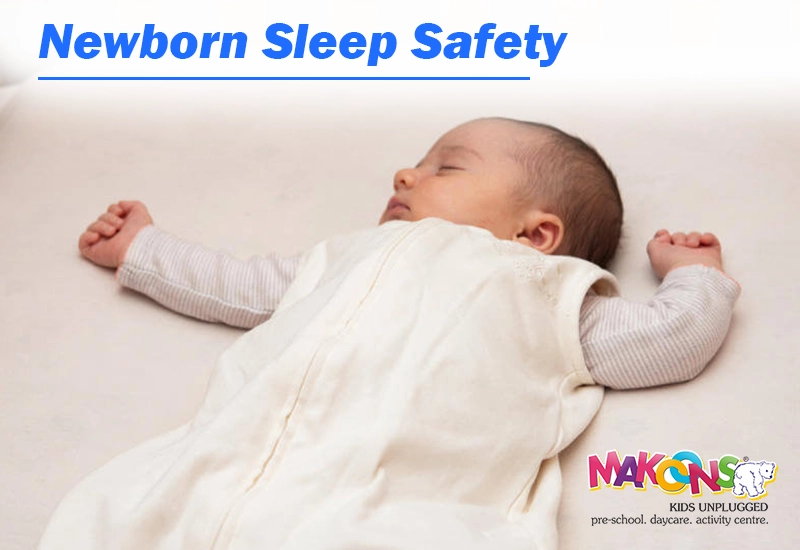Not to scare the new parents but sleep related issues are common with children who are between 1 month to 1 year in age, hence, safe sleep practices for babies is a must. Also, when you read about sleep disorders for children, you might come across the term – SIDS. It expands as Sudden Infant Death Syndrome (SIDS) which leads to majo problems and even, death in children. However, there are chances that you might know it as Sudden unexplained infant deaths (SUIDs).
However, these are preventable. You have to ensure that the newborn sleep position is safe and helps in the growth of the child instead of hampering in their growth. If you want to ensure that the baby is sleeping in a comfortable and secure position, here’s the sleep ABC for you.
A for alone – You should ensure that your baby is sleeping alone on the comfortable surface. When you sleep with the baby or stuff their sleeping place with toys or too many pillows, it creates the risk factor. The baby doesn’t get enough space to sleep and causes discomfort.
B for back position – You should avoid letting the baby sleep on the side or upside down on their stomach. You should make the baby sleep on the back and try that they inculcate this habit in the long run.
C for crib – You should ensure that the baby’s crib is empty. It should not have any hard materials especially near the sleeping area. Also, you should try and avoid that the crib has any extra pads, pillow, or blanket. Keep the crib clean and free from any diapers or other packets.
How Long Does The Baby Sleep?
The day has 24 hours and hence, the newborn sleep environment lasts for 16-17 hours. However, parents should know that newborns get up to eat every two to three hours. Babies that are breastfed often get up to drink milk every two to three hours. But, it’s not the same for babies that are bottle-fed. They often need feed every three to four hours.
However, if your child is having a great long period of sleep in newborns, you should ensure that it should not be broken up for feeding. Until your baby exhibits healthy weight gain, which often occurs during the first few weeks, wake him or her up every three to four hours to feed.
For parents, the first few months of a baby’s existence can be the most difficult. There are chances that the parents may have to get up frequently during the night to care for the infant. Also, it is important to understand that every infant sleeps in a distinct way. By the time they attain two to three months of age, some babies begin to sleep “through the night” which means that they can have a sleep for five to six hours at a stretch, while others do not.
Hence, the safe sleep for newborns is specific to their needs and also, their health. Parents should ensure proper care while putting their baby to sleep.
How To Ensure Newborn Sleep Safety
Some parents decide to share a room with their infant during the first few weeks of life. It is a common practice while ensuring the best newborn sleep environment.
But, does this work?
Sharing the room isn’t a problem as long as parents are ensuring safe sleep practices for babies.
Also, you have to understand the newborn sleeping guidelines. So, let’s begin with understanding the concept of room-sharing.
When you put your baby’s crib, portable crib, play yard, or bassinet in your bedroom rather than a separate nursery, this is known as room-sharing. This practice keeps the infant close by and facilitates nighttime feeding, comforting, and observation. Without sharing a bed, the American Academy of Pediatrics (AAP) advises room sharing.
Sharing a room is safe, but sleeping with your baby in bed is not. You should about it as it helps you follow the infant sleep safety tips. The risk of SIDS (sudden infant death syndrome) and other sleep-related fatalities is increased when people share beds.
Taking Steps For Newborn Sleep Safety
Are you thinking about how to make baby sleep safely?
Here are the top 3 recommendations that ensure newborn sleep safety.
Position For Sleeping
The safe sleeping practices for babies begin with the right position for them to sleep. When your baby goes to sleep or naps, always put them on their back. It is a thumb rule that you can follow for the first few months.
If at all possible, share a room. It may aid in preventing SUIDS. You can get up and check on the baby.
Create A Secure Environment At Home
Compared to adults, babies require one more layer of clothes. Coziness will help safe sleep for newborns. However, clothes should be comfortable for them throughout the night. You can dress your infant in pajamas or onesies that are warmer than your own.
Tummy Time
Babies who spend time on their stomach are less likely to develop bald spots and flat places on their head. However, another step to ensure comfortable newborn sleep environment is by only engaging in tummy time while your infant is awake and you are able to be with them.
Also Read – Baby’s First Year: Foods to Avoid & Safe Alternatives
Conclusion
Well, that’s all about the infact sleep safety tips that will help the baby sleep comfortably and avoid any issues related to their health or growth. Parents should know the potential issues, concerns, and tips that they can follow that helps them and the baby be confident about the sleep schedule, especially in the first few months of the baby’s growth.


